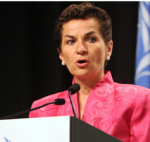Figueres provided an overview of the state of the negotiations, highlighting “steady progress in the right direction,” but recognizing that the pace is slow.
She noted encouraging progress on adaptation issues and operationalizing the Cancun Agreements, and welcomed the discussions on how the Kyoto Protocol's second commitment period will come into effect.
 5 December 2011: Christiana Figueres, UNFCCC Executive Secretary, participated in the fifth Global Business Day, on the sidelines of the 17th session of the Conference of the Parties (COP 17) to the UNFCCC in Durban, South Africa. During the event, she engaged in a panel discussion on the theme, “What is at stake in Durban? Why should a Durban deal be relevant for business?”
5 December 2011: Christiana Figueres, UNFCCC Executive Secretary, participated in the fifth Global Business Day, on the sidelines of the 17th session of the Conference of the Parties (COP 17) to the UNFCCC in Durban, South Africa. During the event, she engaged in a panel discussion on the theme, “What is at stake in Durban? Why should a Durban deal be relevant for business?”
Figueres provided an overview of the state of the negotiations, noting encouraging progress on adaptation issues, particularly on national adaptation plans and loss and damage. She also reported that a draft was on the table under the Ad Hoc Working Group on Long-term Cooperative Action under the Convention (AWG-LCA) track, which lays out “a good foundation” to operationalize the Cancun Agreements.
On the Ad Hoc Working Group on Further Commitments for Annex I Parties under the Kyoto Protocol (AWG-KP) track, she welcomed the fact that negotiations have moved beyond whether there will be a Kyoto Protocol second commitment period, to how it is going to come into effect. Figueres added that if the instruments of the Green Climate Fund (GCF), the Technology Mechanism and adaptation are approved in Durban, this would be the first clear open door for the private sector “to be more involved in a focused way.” She concluded by noting “steady progress in the right direction,” although recognizing that the pace is slow. She also called on business to “judge the process by the current, not the waves,” noting that while the waves may be going up and down, the current is steady and flowing in one direction.
In the ensuing question-and-answer session, Figueres clarified that the GCF likely will not be operational until 2013. On the Kyoto Protocol second commitment period, she underlined that governments are discussing the conditions put forward by the EU for supporting it. Going forward, she called on the private sector to “do more, do more, and once you have done everything you can, do more.” Figueres also announced the launch, by the UNFCCC Secretariat, of the Momentum for Change initiative, a platform that aims to highlight projects undertaken by public-private partnerships that have been successful in addressing adaptation or mitigation.
The one-day event was organized by the World Business Council for Sustainable Development (WBCSD), the International Chamber of Commerce (ICC), and the National Business Initiative (NBI). [IISD RS Coverage of Global Business Day]